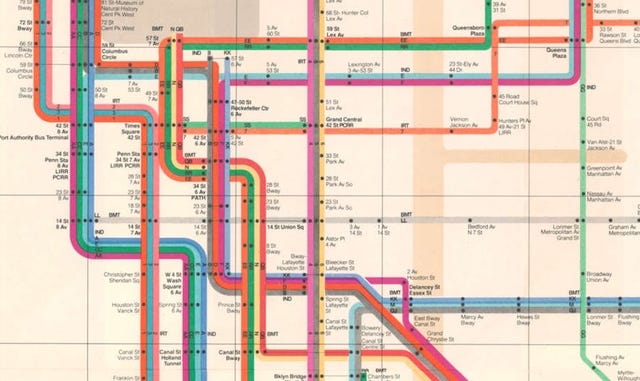Five Things: Great-Power Competition, AI Rights, Subway Maps, Student Help Desk, Dishwasher People
It's Sunday. Read this now.
Hello and welcome back to Five Things!
Last week was nice and short with Monday off and next week will also be a four-day work week with Labor Day on May 1st. I find it interesting that we are still stuck on a five-day work week, even though we have had tons of productivity gains and a gazillion tools and regulations to be able to create a more flexible work week. I’m certain we could accomplish in four days what we accomplish in five days, especially in office environments with tons of meetings to coordinate meetings about meetings that have to be held. Then again, Labor Day is a pretty good reminder that not all jobs are created equal and many people still have to endure shitty jobs to earn minimum wage in order to feed their families. I’m pretty privileged that I can easily talk about a four day workweek, others don’t even have the luxury to think about it.
There’s one thing that would really annoy me about a four-day work week, assuming that people would shift their days around between Monday and Friday. Somebody would always send you an out-of-office email announcing that he or she won’t be in the office that day. Instead of just replying the next day. These emails are totally not helpful as I never expect anyone to answer right this instance. But I do get mails from people who only work part-time, so everytime I email them in the afternoon, I get an ooo-mail. Hopefully my AI assistens will weed those out for me in the future, before it gains conscience and does what it wants.
Have a great Sunday!
The Rise and Fall of Great-Power Competition
Trump’s interest in a great-power concert does not derive from a deep understanding of this history. His affection for it rests on impulse. Trump seems to see foreign relations much as he sees the worlds of real estate and entertainment, but on a larger scale. As in those industries, a select group of power brokers are in constant competition—not as mortal enemies, but as respected equals. Each is in charge of an empire that he may manage as he sees fit. China, Russia, and the United States may jockey for advantage in various ways, but they understand that they exist within—and are in charge of—a shared system. For that reason, the great powers must collude, even as they compete.
This article is helpful for understanding the shit-show we’re in right now.
If A.I. Systems Become Conscious, Should They Have Rights?
It’s hard to argue that today’s A.I. systems are conscious. Sure, large language models have been trained to talk like humans, and some of them are extremely impressive. But can ChatGPT experience joy or suffering? Does Gemini deserve human rights? Many A.I. experts I know would say no, not yet, not even close.
But I was intrigued. After all, more people are beginning to treat A.I. systems as if they are conscious — falling in love with them, using them as therapists and soliciting their advice. The smartest A.I. systems are surpassing humans in some domains. Is there any threshold at which an A.I. would start to deserve, if not human-level rights, at least the same moral consideration we give to animals?
It will be interesting to see how AI campaigns for its rights once Artificial General Intelligence has been achieved.
Spaghetti Underground
The subway as we know it today is a Frankenstein’s monster of once-separate transit systems. The Brooklyn Rapid Transit Company (BRT) formed in 1896; within four years it had acquired almost all the borough’s rapid transit operations. (It would change its name to the Brooklyn–Manhattan Transit Corporation, or BMT, in 1923 after filing for bankruptcy and restructuring.) In 1904 the first Interborough Rapid Transit Company (IRT) underground subway line opened, running from City Hall in the south to 145th and Broadway in the north. For the next quarter century or so, these two privately owned systems operated in competition with each other, running trains mostly on city-built tracks that the companies leased. Then, in 1932, came the first line of the Independent Subway System (IND), owned and operated by the city itself.
Each system had its own signage, its own maps. The lines were known by names such as the “Eighth Avenue Line” (on the IND) and the “Lexington Line” (on the IRT). In 1940 the New York City Board of Transportation, which ran the IND, took over the BMT and IRT, following a long (and sadly still common) tradition of socializing loss-making enterprises while allowing private profits to proliferate. Slowly, like advertisements wheatpasted over one another on green-painted plywood, signage from various eras and transit companies began to accumulate. Eventually it was chaos.
Subway maps can be so amazing. It’s been a long time since I rode the subway in New York City, but I was fascinated by the vastness of the subway system.
The Alabama Landline That Keeps Ringing
A day’s worth of calls to Foy would look a lot like someone’s browser history: What is cefuroxime prescribed for? What’s the average cost of an acre of land in Texas? What’s the cheapest property in New Jersey? How much is Elon Musk worth? What’s the customer service phone number for Costco? How much is a ticket to the Super Bowl? What is watercress? What is that weird smell? Are AirPods Pro 2 waterproof? What do I do if there’s a snake in my house? What are all the names for female genitals? (Foy student workers won’t respond to that last question, but that doesn’t stop callers from asking it.)
About 13 million people in the US and 2.6 billion people globally don’t use the internet, whether for reasons of availability, desire, cost, or religion. Some may have it but don’t feel confident using it. To their callers, who dial from all over the world, these students are the internet. And lucky for callers, these students are remarkably non-judgmental when it comes to the questions they’re asked.
This is just wonderful, both for the students who are answering the phones and the people who call to ask questions. Please don’t ever think about an AI chatbot here.
There Are Two Types of Dishwasher People
The dishwasher is not just the weird wet box we share our homes with—it’s the site of so many of our cultural and individual values. Loading the dishwasher is, don’t get me wrong, about loading the dishwasher, but I’ve come to understand that it is also about efficiency and optimization, space and time, cleanliness and disgust. The Scandinavian architect’s dishwasher is a beautiful thing, but it’s also, in a certain light, self-indulgent and fussy, more art project than act of service. The stimulant-addled raccoon’s is arguably something much worse: negligent and unsanitary, evidence of a failed commitment to the family. (To be clear, if the raccoon is a woman, especially a mother, society looks even less kindly on her.) In both cases, the criticism is not completely superficial. Dishes are what we eat off of, after all, and eating is how we take care of one another.
I am very tolerant about the specifics of loading the dishwasher and I believe in the 80/20 rule, so I really don’t care about the absolutely optimal way of loading the dishwasher as long as most things get cleaned. Oddly, there’s always one item in the dishwasher that refuses to be part of the cleaning process, and it doesn’t matter who loaded the dishwasher.
That’s it. Have a great Sunday! If you missed last Sunday’s edition of Five Things, have a look here:
— Nico








“In every relationship, there’s one person who loads the dishwasher like a Scandinavian architect, and one who loads it like a raccoon on meth.“
…Or there’re TWO male people that act „Scandinavian“ and TWO female people that are raccoons on meth….